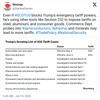🎣 Schneider's Weak Q4
Plus: AGX Freight suspends operations, Gatik goes fully driverless, Werner buys FirstFleet
Trump escalates tariffs with new Section 232 actions and a looming July 9 deadline, pressuring trade partners and raising concerns over inflation and retaliation.

The Trump administration is expanding tariffs on two fronts: broad national security measures under Section 232 and country-specific deals tied to a July 9 deadline.
The Commerce Department is preparing to announce new tariffs under Section 232, targeting sectors considered vital to national security:
“These 232 actions are very likely going to result in import restrictions on almost every good entering the U.S.,” said Nazak Nikakhtar, a former Commerce official.
Jason Miller, a professor at Michigan State, said that this round of Section 232 tariffs appears "broader" and potentially more "inflationary" than in 2018. While earlier actions focused on upstream metals, current measures include finished consumer goods like kitchenware and metal furniture.
At the same time, the U.S. is pushing countries to sign bilateral trade deals or face steep tariffs:
Countries like Japan and Canada may get deadline extensions. Others, like the EU and India, risk 50% tariffs. China and the EU are preparing retaliatory measures, including 25% tariffs on U.S. soybeans and whiskey.
Meanwhile, a coalition of retailers and manufacturers is challenging the president’s authority in court. A bipartisan Senate bill seeks to limit presidential tariff powers under the IEEPA.
To avoid tariffs, companies are shifting supply chains:
Source: Transport Topics | FreightWaves
Join over 14K+ subscribers to get the latest freight news and entertainment directly in your inbox for free. Subscribe & be sure to check your inbox to confirm (and your spam folder just in case).